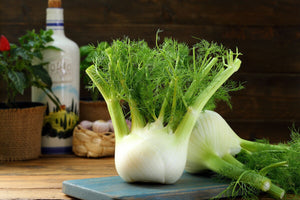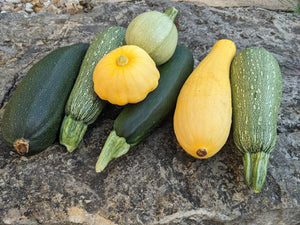5 Effective Tips for Controlling Weeds Naturally This Summer
Seasonal gardeningAll sorts of plants flourish in the warmth of the summer sun, including weeds. Weeds can quickly take over your garden, competing with your plants for nutrients, sunlight, and space. Fortunately, there are effective, natural ways to control weeds and keep your garden thriving.
Here are five proven methods for controlling weeds naturally without using harmful chemicals.

Weeds can originate from all sorts of places. They can come from last year’s garden or be hiding in hay, compost, manure, or poultry litter you incorporate into your garden. Weeds also can come when nearby lawnmowers blow seeds into the yard, or when birds or other animals drop seeds into your garden. That’s why you need effective weed control strategies because it will always be a battle.
5 Tips for Controlling Weeds Naturally
So what can you do to keep weeds from overtaking your garden? Here are a few methods that will help you control weeds.
1 - Weed Prevention With Solarization
Weed prevention is the first step, of course. To prevent weeds from setting in your garden in the off-season, destroy old crop residue. You can also spread some clear plastic sheeting out any time the land is vacant. This process, called solarization, heats the soil up dramatically, killing off old roots and weeds. After 6 weeks or so, the process will be complete, and your soil will be ready for new plantings.

2 - Remove Weeds by Hand Weeding
Hand weeding is an old standby. It requires no equipment or special knowledge. It is an easy task when weeds are tiny seedlings but can be a lot more difficult once weeds become established. A short session of weeding might be fun occasionally. Don't let your garden get out of hand, though, because weeding can be exhausting work, especially if you have back or knee issues. It also isn’t a very practical solution for large gardens with a limited amount of workers. For this reason, hand weeding is best combined with other methods of weed control. The right tools can make all the difference. Read about our favorite weeding tools.
3 - Kill Weeds with Cultivation
You can use several different tools and machines to cultivate the soil. The most popular choices are the good old-fashioned rake and the tiller. Careful hoeing between plants will sever the roots of weeds and dry them out. Tilling or plowing the soil also dries out the roots. Frequent, shallow cultivation can be a great way to keep weeds from becoming established. It can be easy to carelessly damage their roots, so be mindful when cultivating your garden. This is one reason some gardeners prefer no-till methods.

4 - Use Mulch for Weed Control
Mulch is especially helpful for long-season crops that spread and have large root systems that can be destroyed by cultivation.
To mulch is to cover the soil to keep weeds from taking over your garden. Organic mulches include pine straw, shredded leaves, dried grass clippings, straw, sawdust, wood chips, and even paper or cardboard. If you’re using one of these materials, you can turn the mulch under at the end of the season to incorporate some organic material into the soil.
Whatever mulch you choose, it can help to keep the soil cool and cut evaporation of moisture, too. It’s a great way to increase your garden’s productivity and keep weeds at bay.
5 - Plant Cover Crops or Dense Vegetation
Cover crops and dense plantings prevent weeds by outcompeting them for sunlight and nutrients. They are an excellent choice for bare spots between other plantings. After they have grown, cover crops can be tilled back into the soil to add organic matter.
A Note About Chemical Weed Control
Some gardeners avoid herbicides completely. They may have safety concerns or want to avoid the effect they can have on the soil and other plants in the garden. If you do use an herbicide, read the label carefully and make sure it’s compatible with the plants in your garden. There are two types of herbicides: pre-emergence and post-emergence.
- Pre-emergence herbicides keep weed seedlings from emerging in the first place. They are effective on annual grass and broadleaf weeds, but won’t kill emerged weeds.
- Post-emergence herbicides deal with those established weeds. Some herbicides leave a residue that can injure later crops, so think ahead if you’re using herbicides. Even if you use an herbicide, you’ll need a backup plan for those weeds that the herbicide doesn’t kill.

Weeding FAQs
Will boiling water kill weeds?
Boiling water can kill small weeds with shallow root systems. Removing the roots, not just killing the top growth, will keep the weeds from regrowing.
Can I use vinegar to kill weeds?
Vinegar can kill some weeds. It needs to be 20% strength. This method is best for walkways and places where you won't get it on other plants.
How do I stop weeds from coming back?
The best way to keep weeds from coming back is to remove the whole root. You can also use solarization to kill dormant weed seeds.
Long-Term Strategies for Preventing Weeds
Keep soil covered with mulch or ground cover plants.
Pull weeds regularly before they go to seed.
Rotate crops to disrupt weed growth cycles.
Protect your plants and eliminate weeds so they don't have to fight for valuable resources, such as sunlight, water, and soil.
Weeds are tough and competitive and can quickly overtake your garden if you’re not careful. Don’t get discouraged, though. Effective weed control doesn’t have to be a huge time-sink or frustrating exercise. With a little bit of planning and consistency, these weed-eliminating tactics can be used together to create an easier gardening experience.
Effective weed control allows your beloved plants to flourish and produce without any competition.
Written by Teresa Chandler
Popular Posts
-

How to Grow, Harvest, and Use Fennel for Herb and Medicinal Uses
-

When to Plant and How to Grow Tender Zucchini and Summer Squash







Leave a comment